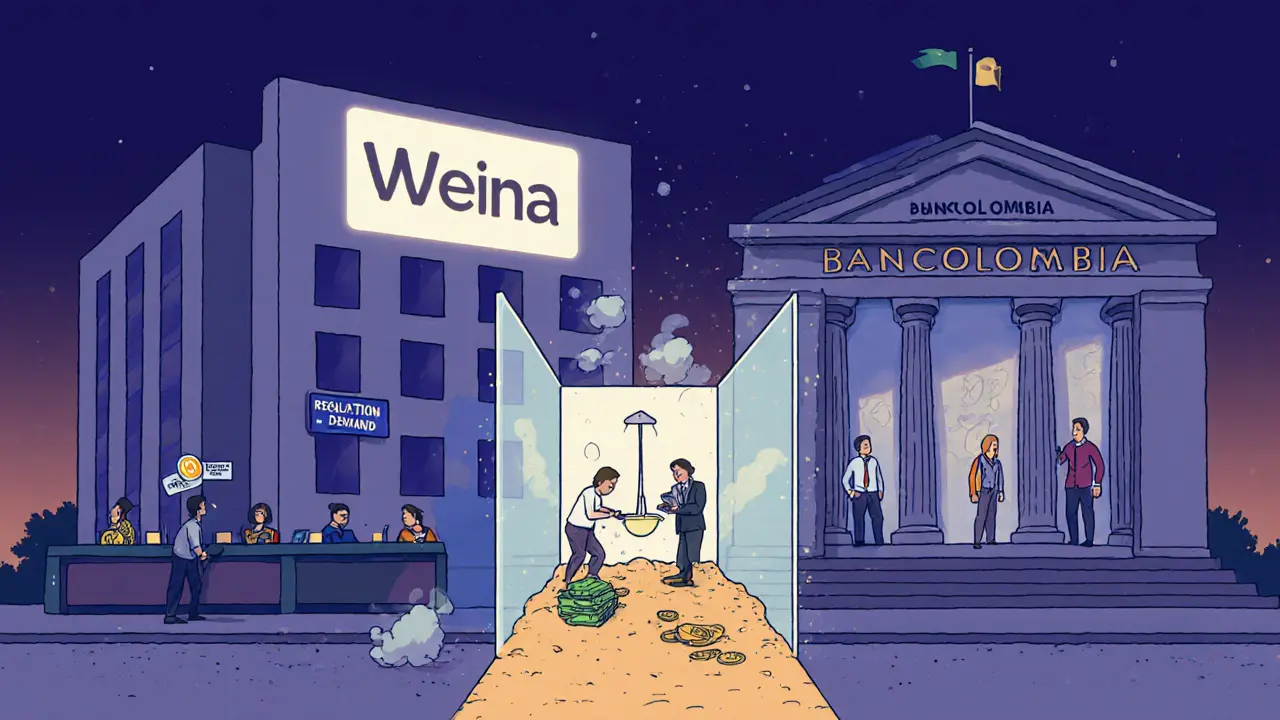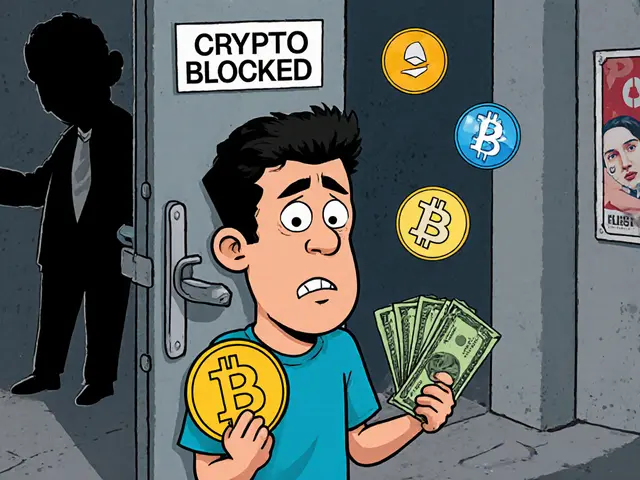Crypto Transaction Cost Calculator
How This Calculator Works
Based on Colombia's banking restrictions, this tool estimates fees and time for moving money between your Colombian bank account and cryptocurrency platforms using peer-to-peer methods. The calculator uses real-world data from the article and current market practices.
Important Note: Colombian banks are prohibited from processing crypto transactions directly. You must use P2P platforms, which typically charge fees between 3-8%. This calculator shows estimated costs based on current market rates.
Colombia doesn’t ban crypto. But if you try to use your bank account to buy Bitcoin, trade Ethereum, or send USDT, you’ll hit a wall. That’s because Colombia’s banking system is legally blocked from touching cryptocurrency-not because it’s illegal, but because the regulators won’t let financial institutions get involved.
What the Ban Actually Means
The Financial Superintendency of Colombia (SFC) issued clear rules in 2022: banks, credit unions, payment processors, and any other supervised financial entity cannot hold, invest in, or process crypto transactions. That means no deposits, no withdrawals, no crypto wallets linked to your savings account, and no crypto investment products offered by Bancolombia, Davivienda, or any other bank. It’s not a total ban on crypto. You can still buy and sell Bitcoin on exchanges like Wenia or Binance. You can hold it in a self-custody wallet. You can even use it to pay for goods if a merchant accepts it. But if you want to move money between your bank and your crypto wallet, you’re out of luck. The bridge is gone. The SFC’s reasoning? Risk. They see crypto as a potential tool for money laundering, tax evasion, and terrorist financing. Their rules require all Payment Service Providers (PSPs) to collect full sender and recipient data for any crypto transaction over $150-and report anything suspicious to the Financial Information and Analysis Unit (UIAF) in real time. That’s stricter than many other countries.How This Affects Everyday Users
For regular Colombians, this creates real friction. Imagine you earn crypto from freelance work abroad. You want to cash out to pay your rent or buy groceries. You can’t link your exchange account to your bank. You have to use peer-to-peer platforms like LocalBitcoins or Paxful, where you meet someone in person or use a third-party payment processor. It’s slower, riskier, and often more expensive. Some users report being flagged by their banks for “suspicious activity” just because they made a transfer to a known crypto exchange-even if the transfer was for a legal purchase. Banks, afraid of fines, have become overly cautious. One user in Medellín said his account was frozen for three weeks after sending $200 to a crypto platform. No proof of wrongdoing, just suspicion. And if you’re a freelancer or small business owner who gets paid in crypto? You’re stuck. You can’t pay your employees via payroll systems. You can’t automate bill payments. You’re forced into cash-based workarounds or expensive third-party services that charge up to 8% in fees to convert crypto to pesos.The Institutional Paradox
Here’s where it gets confusing: Colombia’s biggest bank, Bancolombia, launched its own crypto exchange called Wenia in 2024-and even created its own stablecoin, COPW, pegged to the Colombian peso. How is that allowed if banks can’t touch crypto? The answer lies in a loophole. Bancolombia operates Wenia as a separate legal entity, not under the SFC’s banking supervision. It’s a fintech, not a bank. That means it doesn’t have to follow the same rules. But here’s the catch: Wenia can’t link directly to Bancolombia accounts. Users still have to move money through third-party gateways, often using P2P or cash deposits. This isn’t innovation-it’s a workaround. The same bank that tells you “no crypto” is quietly building a crypto business under a different name. Critics call it hypocrisy. Supporters say it shows the market is too strong to ignore.
How Colombia Compares to Neighbors
Colombia isn’t alone in Latin America, but it’s one of the most restrictive. - Brazil passed full crypto tax laws in 2024, effective January 2025. You pay taxes on gains, but you can trade freely through banks. - Chile approved three licensed crypto custodians in early 2025. Banks can hold crypto for clients under strict rules. - Mexico expanded its Fintech Law in 2024 to include crypto custody and asset management. - Argentina now recognizes Bitcoin as legal tender for international trade. - Peru launched a blockchain pilot for government bonds in 2025. Colombia stands out because it’s the only country in the region where the banking system is outright blocked, yet crypto adoption keeps growing. According to Chainalysis, Colombia ranked in the top 10 globally for peer-to-peer crypto volume in 2024, even with these restrictions.Compliance Costs and Fines
Payment service providers (PSPs) that handle crypto transactions face heavy compliance burdens. They must build systems to capture sender/recipient data, monitor for suspicious activity, and report everything to UIAF. Many have turned to RegTech tools-automated software that scans transactions and flags risks. But it’s expensive. In 2024, the Colombian government fined three PSPs over $1.5 million total for failing to report crypto transactions properly. One company had to shut down its entire crypto payment service because it couldn’t afford the upgrades. Smaller fintechs are struggling. Many can’t compete with larger players like Wenia or Bitso, who have more capital to invest in compliance. The result? Less competition, higher fees, and fewer options for users.
What’s Next for Colombia?
The SFC’s original regulatory sandbox for stablecoins expired in December 2023. No new sandbox has been announced. That’s left new crypto startups in limbo. Without a clear path to approval, innovation is stifled. But pressure is building. Finance Minister Ricardo Bonilla said in June 2023: “Cryptocurrencies are a reality.” He added that regulation is needed-but only if it protects the Central Bank’s monopoly on currency issuance. That’s the key: the government doesn’t want crypto to compete with the peso. Experts believe Colombia won’t lift the banking ban anytime soon. But they do expect new laws. The most likely path? A comprehensive crypto law that allows regulated exchanges and custodians to operate under strict oversight-but keeps banks out of direct involvement. One possibility: the government could create a “crypto gateway” system, where licensed fintechs act as intermediaries between banks and crypto platforms. That way, banks stay clean, but users get a smoother experience.How to Navigate the System Today
If you’re in Colombia and want to use crypto, here’s what works:- Use peer-to-peer platforms like LocalBitcoins, Paxful, or Wenia’s P2P marketplace to buy/sell crypto with cash or bank transfers (if the counterparty accepts it).
- Keep crypto in a non-custodial wallet (like Trust Wallet or Ledger). Never store it on an exchange unless you’re actively trading.
- Track all transactions for tax purposes. Crypto is treated as an intangible asset-capital gains are taxable under personal or corporate income rules.
- Use RegTech-compliant PSPs if you’re a business. They’re more likely to avoid fines and keep your account open.
- Stay updated. The SFC and UIAF frequently update guidelines. Subscribe to their official bulletins.
Frequently Asked Questions
Is it illegal to buy or hold crypto in Colombia?
No, it’s not illegal. You can buy, sell, hold, and use cryptocurrency in Colombia. The ban only applies to banks and financial institutions-they can’t offer crypto services. Individuals and businesses are free to use crypto as long as they follow tax and reporting rules.
Can I use my Colombian bank account to buy Bitcoin?
Not directly. Colombian banks are prohibited from processing crypto transactions. You can’t link your bank account to Binance, Coinbase, or Wenia. You’ll need to use peer-to-peer platforms where you pay in cash, through mobile wallets, or via third-party payment processors that aren’t regulated as banks.
Why can Bancolombia run Wenia if banks can’t touch crypto?
Bancolombia created Wenia as a separate fintech company, not under the SFC’s banking supervision. This lets it operate a crypto exchange and issue the COPW stablecoin without violating the banking ban. But Wenia still can’t connect directly to Bancolombia accounts-users must move money through external gateways.
Are crypto transactions taxed in Colombia?
Yes. The Colombian tax authority (DIAN) treats crypto as an intangible asset. If you sell crypto for a profit, you owe capital gains tax. If you run a crypto business, your income is taxed under corporate or personal income rules. You must report all transactions and keep records for at least five years.
What happens if I don’t report my crypto transactions?
You risk penalties from DIAN, including fines and interest on unpaid taxes. In severe cases, repeated non-compliance can lead to criminal investigation for tax evasion. The SFC and UIAF also share data with DIAN, so unreported crypto activity is increasingly detectable.
Will Colombia lift the banking ban soon?
Unlikely in the short term. The SFC and Central Bank are focused on maintaining control over the financial system. But experts expect a new crypto law by 2026 that will create a regulated framework for exchanges and custodians-while keeping banks out of direct involvement. The goal isn’t to ban crypto, but to control it.

Johanna Lesmayoux lamare
Can’t believe banks are blocking this when people just want to use their own money.
Rachel Everson
This is such a weird middle ground-crypto’s legal but your bank treats you like a criminal for using it? I get the risk concerns, but the real victims are freelancers and small businesses stuck paying 8% fees just to cash out. It’s not regulation, it’s inertia with a side of bureaucracy.
tom west
Let’s be real-the SFC is terrified of losing control. This isn’t about risk, it’s about power. Banks don’t want competition. They don’t want transparency. They want to keep people dependent on their archaic, slow, overpriced systems. And now they’re hiding behind ‘compliance’ while their own subsidiary runs a crypto exchange. Hypocrisy doesn’t even cover it.
Ashley Mona
OMG yes!! I’ve been there-sent $200 to Binance and got my account frozen for 3 weeks. No explanation, no proof, just ‘suspicious activity.’ Meanwhile, my cousin in Brazil just linked his bank to Binance and got a 5% cashback bonus. Why is Colombia stuck in 2015? 😭
Edward Phuakwatana
The real irony? Colombia’s crypto adoption is thriving *because* of the ban. When institutions shut the door, the underground opens a window. Peer-to-peer isn’t a workaround-it’s a revolution. People are building decentralized financial ecosystems out of necessity, not ideology. This isn’t crypto resisting regulation-it’s society outgrowing the old system. The banks? They’re just the last dinosaurs with a rulebook.
dhirendra pratap singh
Wenia is a SCAM. Bancolombia is laughing all the way to the bank while normal people get flagged for sending $200. I saw a guy get arrested for using LocalBitcoins-he had no idea it was even legal! This system is rigged. 💔
Stephanie Platis
Actually, the SFC’s position is entirely reasonable: financial institutions must maintain integrity, stability, and compliance with AML/KYC standards. Allowing crypto transactions without robust, auditable, real-time monitoring would be reckless-and the fines prove it. This isn’t anti-crypto; it’s pro-responsibility.
Michelle Elizabeth
So… you’re telling me I can’t use my Bancolombia account to buy Bitcoin, but I can buy a $5000 Rolex with it? Because that’s what I did last week. Crypto’s the new cocaine, I guess.
Joy Whitenburg
im so over this… i just wanna pay my rent with usdt and they make it feel like im smuggling diamonds? lmao
ty ty
Of course Colombia’s banks hate crypto. They’re terrified of being replaced by people who actually know how to code. Meanwhile, the average Colombian is smarter than the entire SFC combined. This isn’t regulation-it’s fear dressed up as policy.
Debraj Dutta
Interesting how Colombia’s approach mirrors India’s early crypto stance-restrictive, but not prohibitive. The real challenge is enforcement. If the government wants to curb illicit flows, why not build a transparent, licensed gateway instead of forcing users into shadow markets? The current system benefits only the largest players.
Phil Bradley
It’s not about crypto. It’s about control. The Central Bank doesn’t want people choosing value over pesos. They don’t want a world where your money isn’t tied to a government’s printing press. So they build walls. But people are already climbing over them. The question isn’t if the ban will fall-it’s how messy the collapse will be.
Suhail Kashmiri
People think they’re being smart by banning banks from crypto but they’re just making it easier for criminals. Real people get punished. The rich use offshore wallets. The poor get their accounts frozen. This isn’t justice. It’s class warfare with a compliance badge.
Arthur Coddington
So let me get this straight-Colombia bans banks from crypto but lets them create a crypto company? That’s like banning cars but letting Ford open a bicycle shop. The whole thing is a joke. I don’t even know why I’m still here. I’m just waiting for the next ‘crypto is the future’ TED Talk while my wallet sits empty.
BRYAN CHAGUA
It’s important to recognize that while the current framework is frustrating, it’s also a transitional phase. Many nations have gone through similar regulatory growing pains. Colombia’s focus on reporting and transparency, even if overly cautious, lays the groundwork for future innovation. The key is to ensure that compliance doesn’t become a barrier to inclusion. A regulated gateway model-where licensed fintechs act as bridges-could offer a balanced path forward without compromising financial integrity.